Major Peter McGuigan, communications and public relations secretary for The Salvation Army in Sri Lanka, launched the wells at specially organized opening ceremonies in each village. He brought greetings from Colonel Alistair Venter, territorial commander of The Salvation Army in Sri Lanka, and Commissioner Susan McMillan, territorial commander of The Salvation Army in Canada and Bermuda, the funding body of the Safe Water project.
Major McGuigan commended the teamwork involved in establishing each well, from the research phase through to completion. “In a world in which people and business can be self-focused, looking out for their own gain rather than the good of all, these wells are a symbol of what can happen when we all work together,” he said. “We can overcome challenges together, despite any differences of culture, creed or tradition.”
In each village, Major McGuigan thanked all involved, including local village and society leaders and volunteers, government representatives and contractors Aqua Technology and the National Water and Drainage Board. He also recognised the Hon. Mr. Thalatha Athukorala, MP, who thanked The Salvation Army for its commitment to addressing a critical situation in the province. In 2014, Athukorala travelled to Colombo, the capital of Sri Lanka, to meet with Salvation Army leaders when other attempts to provide the organization and funding necessary to make the wells possible had failed.
The Safe Water project involves the construction of 15 deep water wells in North Central Province villages by 2018. Each well, once opened, will change the lives and circumstances of up to 3,000 people, including hundreds of families. Associated with the wells are livelihood development schemes where The Salvation Army brings training and resources to individuals, families and villages to help them move toward self-reliance. This includes training in new agriculture techniques, sewing and other livelihood skills.
A fully operational mobile medical clinic, funded by The Salvation Army U.S.A. Western Territory, is moving around the province testing for kidney disease and associated health problems. Early detection is critical to successful treatment.
A growing affection toward The Salvation Army was evident in each village as commemoration plaques were unveiled, the operating systems officially started and representative speeches given. The work of the Salvation Army project management team, led by Dinuka and Rasangika Rajapaksha in Polonnaruwa, and business manager Dinusha Perera in Colombo, was recognized with heartfelt applause.
“It was Jesus Christ who said that the greatest two things we can do in our lives is 'to love God and love our neighbour,' ” concluded Major McGuigan. “This is what motivates The Salvation Army. We seek both the good of the individual and the good of the whole community, without discrimination. We are working to create a better tomorrow.”
The well openings were reported on Sri Lanka's popular Sirasa and Derana national television news, and in local newspapers.
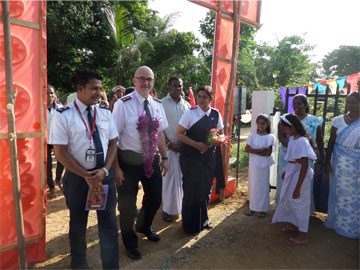 The traditional march to the site of one of the new wells. From left, Dinuka Rajapaksha, project manager; Mjr Peter McGuigan; Cpt Tara McGuigan, territorial youth secretary; and the Hon. Mr Thalatha Athukorala, MP
The traditional march to the site of one of the new wells. From left, Dinuka Rajapaksha, project manager; Mjr Peter McGuigan; Cpt Tara McGuigan, territorial youth secretary; and the Hon. Mr Thalatha Athukorala, MP
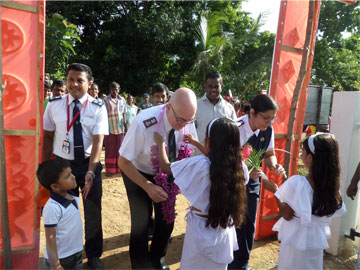 Mjr Peter McGuigan and Cpt Tara McGuigan receive a traditional welcome from children at the site of a new Salvation Army Safe Water well
Mjr Peter McGuigan and Cpt Tara McGuigan receive a traditional welcome from children at the site of a new Salvation Army Safe Water well
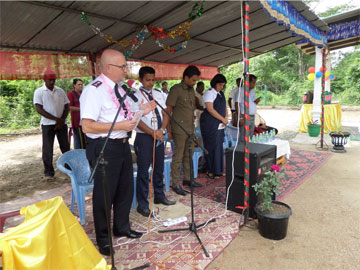 Mjr Peter McGuigan speaks at the well openings: “We face challenges in this world but we cannot allow the challenges to defeat us. We can overcome them, together, despite any differences of culture, creed or tradition”
Mjr Peter McGuigan speaks at the well openings: “We face challenges in this world but we cannot allow the challenges to defeat us. We can overcome them, together, despite any differences of culture, creed or tradition”
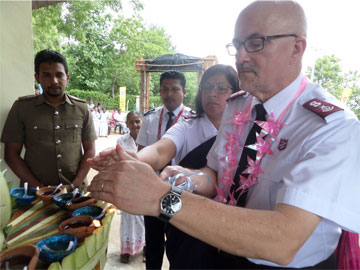 Mjr Peter McGuigan lights a candle during the traditional oil lamp ceremony
Mjr Peter McGuigan lights a candle during the traditional oil lamp ceremony
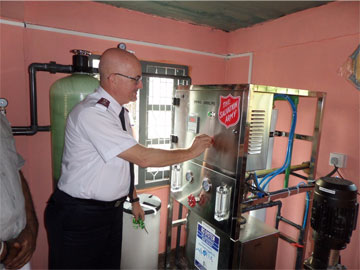 Starting the pump and filter system
Starting the pump and filter system
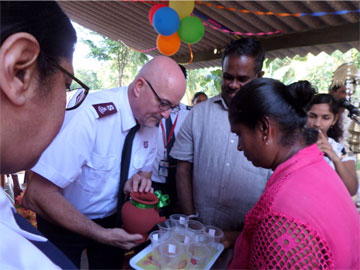 Distributing safe water from one of the newly opened wells
Distributing safe water from one of the newly opened wells
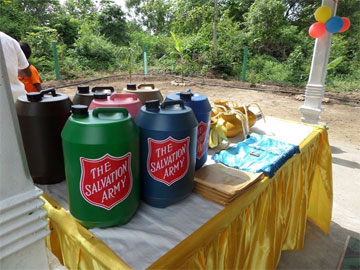 Water containers for distribution. Locals pay one rupee and fifty cents per litre to ensure the wells can be maintained and are sustainable
Water containers for distribution. Locals pay one rupee and fifty cents per litre to ensure the wells can be maintained and are sustainable






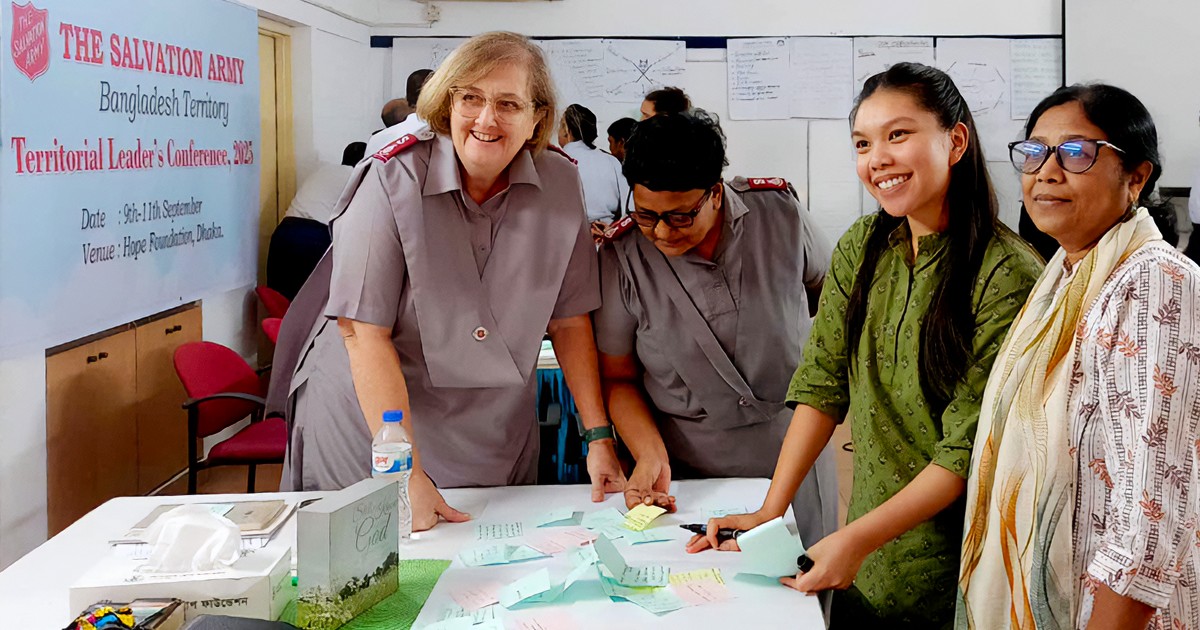
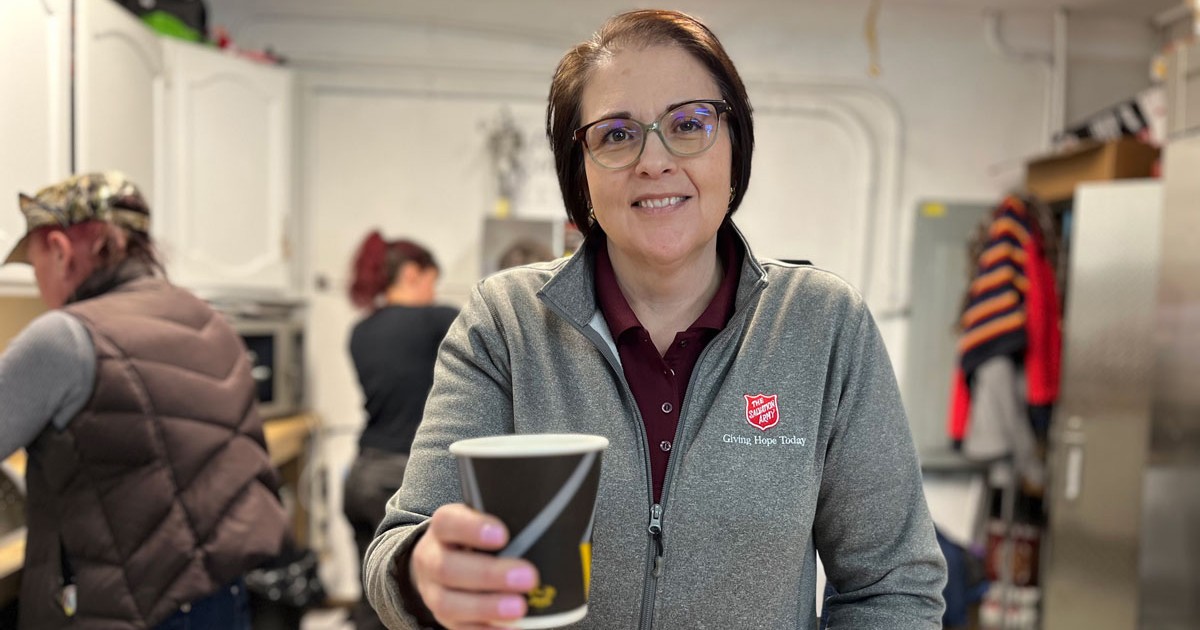


Leave a Comment